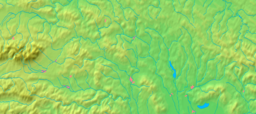Prešov
| Prešov | |||
| City | |||
|
City centre of Prešov
|
|||
|
|||
| Country | Slovakia | ||
|---|---|---|---|
| Region | Prešov | ||
| District | Prešov | ||
| Tourism region | Šariš | ||
| River | Torysa | ||
| Elevation | 250 m (820 ft) | ||
| Coordinates | 49°00′06″N 21°14′22″E / 49.00167°N 21.23944°ECoordinates: 49°00′06″N 21°14′22″E / 49.00167°N 21.23944°E | ||
| Area | 80.40 km2 (31.0 sq mi) | ||
| Population | 91,352 (2012-12-31) | ||
| - metro | 161,000 | ||
| Density | 1,136/km2 (2,942/sq mi) | ||
| First mentioned | 1247 | ||
| Mayor | Ing. Andrea Turčanová (Independent) | ||
| Timezone | CET (UTC+1) | ||
| - summer (DST) | CEST (UTC+2) | ||
| Postal code | 080 01, 080 02, 080 03, 080 04, 080 05, 080 06 | ||
| Area code | +421-51 | ||
| Car plate | PO, PV | ||
| Statistics: MOŠ/MIS | |||
| Website: www.presov.sk | |||
Prešov (Slovak pronunciation: [ˈpreʃow]) is a city in Eastern Slovakia. It is a seat of the administrative Prešov Region (Slovak: Prešovský kraj) and Šariš. With a population of approximately 91,352, it is the third-largest city in the country. There are many tourist attractions in Prešov such as castles, pools and the old town.
The first written mention is from 1247 (Theutonici de Epuryes). Several authors tried to derive the name from Hungarian: eper - a strawberry. The theory was questioned in 1940s and newer Slovak works suggests a derivation from Slavic personal name Preš/Prešä and its later phonetic adaptation (introduction of e before the initial consonant group and removal of the suffix, the original form then ceased to exist). Strawberries depicted on the coat of arms of Prešov are not necessarily determinative, the Latin name Fragopolis (strawberry city) is only a modern translation.
Other alternative names of the city include German: Eperies (between 1938 and 1945 also Preschau), Hungarian Eperjes , Latin Fragopolis, Polish Preszów, Romany Peryeshis, Russian Пряшев (Pryashev) and Rusyn and Ukrainian Пряшів (Priashiv).
People from Prešov are traditionally known as "koňare" which means "horse keepers".
The old town is a showcase of Baroque, Rococo and Gothic architecture. The historical center is lined with buildings built in these styles. In the suburbs, however, the Soviet influence is clearly evident through the massive concrete panel buildings (paneláky) of the housing estates (sídliska) and the Sekčov district. More Soviet-style architecture is seen in the government buildings near the city center.
...
Wikipedia







